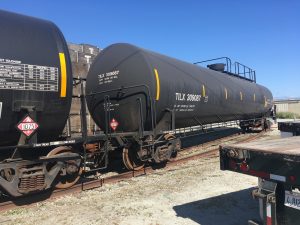
There is no need for abstraction or ambiguity. Come to Watsonville and see. Liquefied Petroleum Gas (LPG) tank cars cross the Pajaro River, move down Walker Street, cross West Beach, and jog left to Lee Road. From there they cross the farmlands and over the Watsonville and Harkins sloughs, and sometimes even out to Buena Vista Drive. They park by the hundreds in town and garden and wetlands.
This is the landscape developed by the Santa Cruz County Regional Transportation Commission (RTC). As for the impact zone, Watsonville, safe walking and biking options (in one of the least safe biking and walking cities in California), and more accessible public open space (in the most densely populated city in Santa Cruz County), are being traded by the RTC to a rail monopoly.
It is not Watsonville’s fault, but there is nothing the city or citizens can do to stop this. Once the RTC grants Progressive Rail Incorporated the rights to operate on the publicly owned Santa Cruz Branch Line, it will cede local control to the federal Surface Transportation Board (STB).
Rail transportation in the US is federally regulated. The STB is mandated and empowered to prevent local interference in national commerce. “Local interference” includes local environmental laws, as adjudicated by the STB. Progressive Rail and its fossil fuel caravan will be a local monopoly with no local control. Once in place, Progressive Rail’s right of way will be Progressive Rail’s right of way.
This will be Progressive’s first operation in California. Watsonville Slough will provide an inexpensive marshaling area for LPG unit trains and will be Progressive’s profit center and its value proposition. Progressive’s specialty is rail logistics for larger carriers. As for local service, moving hundreds of tank cars in order to deliver a load of lumber, or anything else, will be a very low priority.
Until last year the RTC had granted the Branch Line right of way to Iowa Pacific. Iowa Pacific parked over 100 of their tank cars across the Watsonville Slough and then evaded paying their $4.50 a day per car rent to the RTC. To fulfill the RTC-mandated passenger rail service, Iowa Pacific ran the Train to Christmas Town, an undulating holiday season jaunt to the Buena Vista Landfill, and later to the KOA. The RTC is repeating the same thing and expecting different results.
What the new deal with Progressive Rail will do is a sort of compromise: industrial rail for Watsonville and scenic trails for Santa Cruz.
Keeping Watsonville on the wrong side of the tracks has come through a northern alliance of rail buffs, an RTC committed to past policy failures, and, strangely, the Sierra Club and the Land Trust of Santa Cruz County.
The Land Trust advocacy for rail is particularly unsettling because the Watsonville Slough Farm, adjacent to the LPG tank car parking, is under their stewardship. The immediate visual impact and the potential environmental hazard to the slough should be obvious. Instead the Land Trust has been one of the loudest proponents of rail, buying full-page advertising to that end.
When one asks why Santa Cruz environmentalists support industrial rail for Watsonville, is it because it’s not in their backyard?
Originally published May 7, 2018 in the Santa Cruz Sentinel
